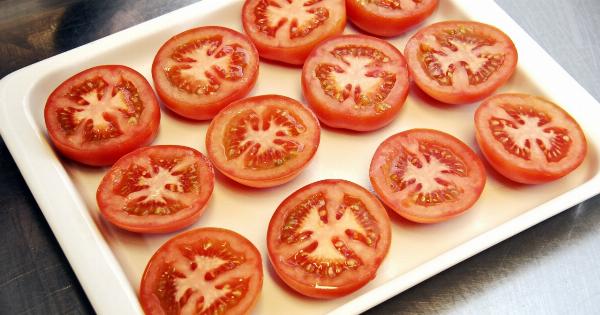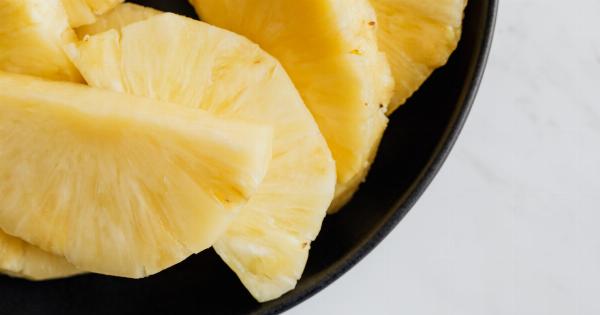A fever is a common symptom of various illnesses, usually resulting from an infection or inflammation. It is characterized by an elevated body temperature, which is the body’s natural response to fight off infections.
During a fever, our body’s metabolism increases, and certain dietary considerations can help support the immune system, manage symptoms, and promote recovery. In this article, we will discuss some guidelines for eating during a fever that can assist in alleviating discomfort and promoting overall well-being.
Stay Hydrated
One of the most important aspects of managing a fever is to ensure adequate hydration. Infections and fever cause increased fluid loss through sweating, increased respiratory rate, and dehydration.
Moreover, high body temperature can result in an increased risk of dehydration. To prevent dehydration, it is crucial to drink plenty of fluids regularly.
Water is the most essential fluid for hydration. Sipping small amounts of water throughout the day is recommended. Other fluids such as herbal teas, clear broths, and diluted fruit juices can also contribute to hydration.
Avoid caffeinated and sugary beverages as they can have a diuretic effect and worsen dehydration.
Consume Nutrient-Dense Foods
Although you may not feel like eating much during a fever, it is essential to consume nutrient-dense foods to support your immune system and aid recovery.
Include a variety of foods from different food groups to ensure an adequate intake of essential nutrients.
Focus on consuming lean proteins such as chicken, fish, eggs, and legumes. Proteins are the building blocks of our body and play a vital role in repairing damaged tissues and supporting immune function.
Opt for grilled, boiled, or baked preparations rather than fried options.
Incorporate an abundance of fruits and vegetables into your diet as they are rich in vitamins, minerals, and antioxidants. These nutrients can help boost your immune system and enhance your body’s ability to fight off infections.
Consider consuming fruits and vegetables that are easy to digest, such as bananas, applesauce, cooked vegetables, and soups.
Include whole grains such as brown rice, whole wheat bread, and oats in your meals. These complex carbohydrates provide sustained energy and are a good source of fiber, aiding in digestion.
Avoid refined carbohydrates and sugary foods as they can cause energy spikes and crashes.
Optimize Nutritional Supplements
In certain cases, nutritional supplements may be beneficial in supporting your recovery during a fever. However, it is always recommended to consult with a healthcare professional or a registered dietitian before starting any supplements.
Vitamin C is often touted for its immune-boosting properties. It can be found in citrus fruits, bell peppers, strawberries, and broccoli.
If you have difficulty consuming enough fruits and vegetables, a vitamin C supplement may be considered under the guidance of a healthcare professional.
Zinc is another mineral that is essential for a healthy immune system. Sources of zinc include seafood, lean meats, nuts, and seeds. If your diet lacks zinc-rich foods, a zinc supplement may be recommended to support immune function.
Probiotics are beneficial bacteria that can help maintain a healthy gut. They can be found in yogurt, kefir, sauerkraut, and other fermented foods.
Consuming probiotic-rich foods or taking a probiotic supplement may support your immune system, especially if you have been prescribed antibiotics.
Avoid Trigger Foods
During a fever, certain foods can exacerbate symptoms and make you feel more uncomfortable. It is advisable to avoid or limit the consumption of these trigger foods to ease any discomfort you may be experiencing.
Spicy foods, such as chili peppers and hot sauces, can irritate the stomach lining and increase overall body temperature. They can also lead to indigestion and heartburn. It is best to avoid these foods until your fever subsides.
High-fat and fried foods can be heavy and difficult to digest, especially when your body is already under stress. These foods can cause bloating, gas, and discomfort. Opt for lighter, easily digestible options such as baked or grilled preparations.
Processed foods, including microwave meals, snacks, and sugary treats, offer little to no nutritional value. These foods can add stress to your immune system and hinder your recovery.
Instead, focus on whole, unprocessed foods to provide essential nutrients to your body.
Maintain Food Safety
During a fever, the body’s immune system is already compromised, making it more vulnerable to foodborne illnesses. Therefore, it is crucial to maintain proper food safety practices to prevent any additional health complications.
Wash your hands thoroughly before handling any food items and often during food preparation. Clean all surfaces and utensils used for food preparation to eliminate any potential contaminants.
Cook all meats, poultry, and seafood to the appropriate internal temperatures to kill any bacteria or pathogens present.
Refrigerate perishable foods promptly and avoid leaving them at room temperature for an extended period. Consuming spoiled or contaminated foods can lead to further health issues, which may prolong your recovery time.
Schedule and Portion Control
When you have a fever, your appetite may fluctuate, and you may not feel like eating regular meals. Instead of skipping meals altogether, aim to have frequent small meals throughout the day.
This can provide a continuous supply of nutrients to support your immune system and optimize recovery.
Listen to your body and eat until you feel comfortably satisfied without overeating. Overeating can make you feel heavier, sluggish, and may impact digestion. Smaller portions can be easier to digest and may help manage any queasiness or discomfort.
Promote Rest and Replenish Electrolytes
Rest is essential during a fever as it allows the body to allocate energy towards fighting off the infection and promoting healing. Along with rest, replenishing electrolytes can help maintain the body’s fluid balance.
Electrolytes such as sodium, potassium, and magnesium are crucial for several bodily functions, including muscle contractions and nerve impulses.
Coconut water, sports drinks, and homemade rehydration solutions (containing a combination of water, sugar, and salt) can help replenish lost electrolytes. However, it is essential to ensure that any rehydration solution does not have an excessive sugar content.
In conclusion, managing a fever goes beyond medication and rest. Paying attention to your diet during a fever can support your immune system, alleviate symptoms, and aid in a quicker recovery.
Stay hydrated, consume nutrient-dense foods, avoid trigger foods, practice food safety, and provide your body with adequate rest. If you have concerns about your diet during a fever, it is always best to consult with a healthcare professional for personalized guidance.



























